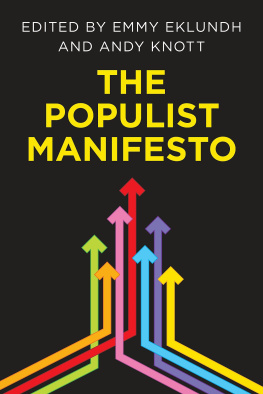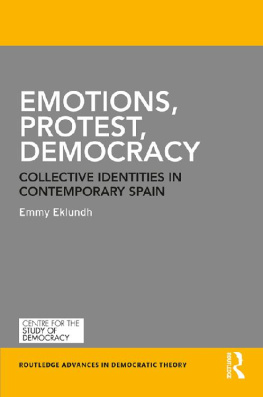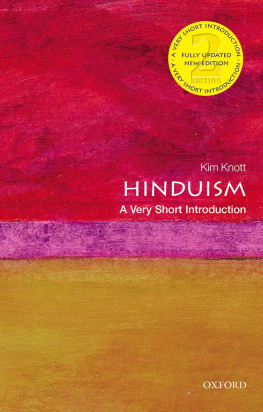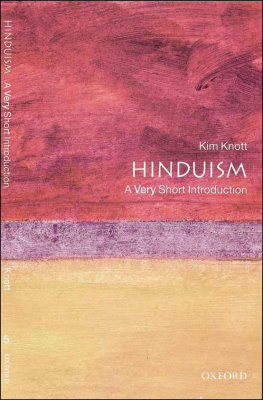Emmy Eklundh and Andy Knott - The Populist Manifesto
Here you can read online Emmy Eklundh and Andy Knott - The Populist Manifesto full text of the book (entire story) in english for free. Download pdf and epub, get meaning, cover and reviews about this ebook. year: 2020, publisher: Rowman & Littlefield International Ltd., genre: Science / Politics. Description of the work, (preface) as well as reviews are available. Best literature library LitArk.com created for fans of good reading and offers a wide selection of genres:
Romance novel
Science fiction
Adventure
Detective
Science
History
Home and family
Prose
Art
Politics
Computer
Non-fiction
Religion
Business
Children
Humor
Choose a favorite category and find really read worthwhile books. Enjoy immersion in the world of imagination, feel the emotions of the characters or learn something new for yourself, make an fascinating discovery.
- Book:The Populist Manifesto
- Author:
- Publisher:Rowman & Littlefield International Ltd.
- Genre:
- Year:2020
- Rating:5 / 5
- Favourites:Add to favourites
- Your mark:
- 100
- 1
- 2
- 3
- 4
- 5
The Populist Manifesto: summary, description and annotation
We offer to read an annotation, description, summary or preface (depends on what the author of the book "The Populist Manifesto" wrote himself). If you haven't found the necessary information about the book — write in the comments, we will try to find it.
The Populist Manifesto — read online for free the complete book (whole text) full work
Below is the text of the book, divided by pages. System saving the place of the last page read, allows you to conveniently read the book "The Populist Manifesto" online for free, without having to search again every time where you left off. Put a bookmark, and you can go to the page where you finished reading at any time.
Font size:
Interval:
Bookmark:

The Populist Manifesto
The Populist Manifesto
Edited by Emmy Eklundh and Andy Knott

Published by Rowman & Littlefield International Ltd.
6 Tinworth Street, London, SE11 5AL, United Kingdom
www.rowmaninternational.com
Rowman & Littlefield International Ltd. is an affiliate of Rowman & Littlefield
4501 Forbes Boulevard, Suite 200, Lanham, Maryland 20706, USA
With additional offices in Boulder, New York, Toronto (Canada), and Plymouth (UK)
www.rowman.com
Selection and editorial matter Emmy Eklundh and Andy Knott, 2020
Copyright in individual chapters is held by the respective chapter authors.
All rights reserved . No part of this book may be reproduced in any form or by any electronic or mechanical means, including information storage and retrieval systems, without written permission from the publisher, except by a reviewer who may quote passages in a review.
British Library Cataloguing in Publication Data
A catalogue record for this book is available from the British Library
ISBN: HB 978-1-78661-262-5
ISBN: PB 978-1-78661-263-2
Library of Congress Cataloging-in-Publication Data
LCCN: 2019956633
 The paper used in this publication meets the minimum requirements of American National Standard for Information SciencesPermanence of Paper for Printed Library Materials, ANSI/NISO Z39.48-1992.
The paper used in this publication meets the minimum requirements of American National Standard for Information SciencesPermanence of Paper for Printed Library Materials, ANSI/NISO Z39.48-1992.
Contents
Emmy Eklundh and Andy Knott
Andy Knott
Mara Esperanza Casullo
Paolo Gerbaudo
Emilia Palonen
Emmy Eklundh
Mark Devenney
Marina Prentoulis
Andy Knott
Emmy Eklundh and Andy Knott
A spectre is haunting Europe (or the west; or the world), the spectre of populism.
This book is titled The Populist Manifesto , and the above lines riff on the most renowned manifesto drafted, but the similarities end there. Manifestoes have enjoyed somewhat of a revival in recent years with manifestoes written on socialism, luxury communism and multiple feminist tracts that invoke the term. Despite such popularity, this is not a manifesto for numerous reasons. Most importantly, there can never be a pure populist manifesto, because manifestoes are about specific political contents, and our understanding of populism is as a form and not as possessing any readily identifiable content. Second, this book is an edited collection featuring seven different authors. We have diverse positions on politics and populism, and such diversity doesnt lend itself to the manifesto form. That said, there is something that unites the contributors to this collection, and that is we all see populism as a potentially positive form of politics. We think its important to state at the outset that we come to our subject with a particular position, rather than as detached, neutral observers of some objective political development. To be more specific, we all favour a left populism, to lesser and greater extents. That means that we are all of the left and are keen to reaffirm the left-right political distinction and we think the left should adopt a populist approach to politics (although some contributors are not exclusively left populists and see the potential in alternative left projects). To say that the left should embrace populism is also to say that (most other) left projects should be rejected. It is to say that in the aftermath of the fall of the Berlin Wall, the left needs to engage in serious reflection. It is to question the viability of communism, the attractiveness and appeal of state socialism, the relevance of and levels of support for anarchism or autonomism, the appropriateness of social democracy to our current conjuncture, and much else besides.
In stating that we have a clear position on politics, on populism, and a left populism more particularly we distance ourselves from most commentators who write on our subject. These other commentators have a clear view on populism: it is an aberration that is an unwelcome intruder into politics and, consequently, to be disparaged. This is how the term is used by most journalists writing on the subject, and by so many politicians. Both of these groups struggle to understand how populism has reared its ugly head, and why significant sectors of the electorate are endorsing it. Such incredulity can be found in academia too. Arguably most prominent here is Jan-Werner Mller, who has been one of the most high-profile commentators on contemporary populism. His 2016 publication What Is Populism? contains a neutral title, which, in turn, suggests a neutral, independent position on the subject, but such neutrality obscures the hostility he directs towards the subject matter. Mller characterises populism as unnecessarily moralistic, straightforwardly anti-pluralist, and a threat to the values that underpin the democratic community. While some populisms display some or all of these characteristics, there are plenty more that share none at all, both from the history of populism and its contemporary versions. So, we argue that Mller has made two mistakes: in adopting an uncritical scientific approach, his purported neutrality hides a clear position on the subject; and second, he has treated populism as a singular ugly whole, whereas we regard that, far from being a singular phenomenon, there are populisms in the plural.
We now live in an era in which there is so much talk on the subject matter of populism. The word populism has gone from being of occasional academic interest to one of the most resorted to in the political lexicon. The word or signifier populism is endlessly discussed, but the meanings bestowed on it what is signified by this signifier are overwhelmingly derogatory. As already indicated, many leading politicians, journalists, broadcasters and even academics use it as a term of dismissal. But such disparaging meanings or significations obscure what populism is and, more importantly, why it has all of a sudden exploded onto our political scene. What ought to provoke even more curiosity is that those that are fingered as being populists rarely and, in most instances, never use the term to describe themselves. So we have the strange situation in which those that are dismissive of it accuse certain opponents of populism, whereas the accused never resort to it. Curiosity is an apt response to such a situation, even better to adopt a critical approach to it.
We indicated earlier that populism is a form and not a content . By form, the contributors to this volume variously describe it as a style, a logic, a discourse or even a practice of doing politics. All these terms are resorted to in order to distance populism from the more widespread understanding that populism is an ideology. The most influential book on contemporary populism is Populism: A Very Short Introduction , published in 2017 by Oxford University Press. In this, and numerous other academic and journalistic articles, one of the co-authors, Cas Mudde, insists that populism is an ideology or, more precisely, what he terms a thin-centred ideology. To say that populism is an ideology is akin to saying it has content. Such an understanding obviously differs from the way in which populism is understood and used in this collection. For us, to repeat, populism is akin to a form rather than a content. And to say this is to say that the populist form can attach itself to very different contents; that is, it affixes itself to very different ideologies. Historically, the ideology that populism has borne closest resemblance to is social democracy it has called for (and often brought about) the broadening of the democratic franchise to the working class and women, the deepening of democratic practice, the control of private economic monopolies through anti-trust legislation, regulations on finance, the expansion of the provision of welfare and education, and much more besides. Such a list is hardly worthy of the demonisation populism is currently subjected to, but this is because most contemporary populisms are no longer attached to this historical content. Rather, it has often become attached to an ethno-nationalism that is exclusionary, nostalgic, unwelcoming and unfit for the serious challenges that we as twenty-first-century citizens are confronted with. The relationship between nationalism and populism is, however, far more complex than what is acknowledged in current debates. This volume would like to question this conflation, and argue that populism, while in many cases conflated with nationalism for ideological and historical reasons, should also be discussed in other terms, including posing the question: can the People be something beyond the Nation?
Font size:
Interval:
Bookmark:
Similar books «The Populist Manifesto»
Look at similar books to The Populist Manifesto. We have selected literature similar in name and meaning in the hope of providing readers with more options to find new, interesting, not yet read works.
Discussion, reviews of the book The Populist Manifesto and just readers' own opinions. Leave your comments, write what you think about the work, its meaning or the main characters. Specify what exactly you liked and what you didn't like, and why you think so.










